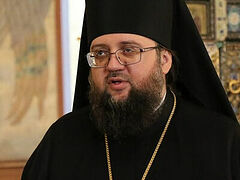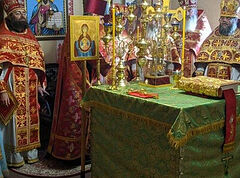Kiev, January 26, 2021
Earlier this month, Deputy Speaker Ruslan Stefanchuk, a member of President Zelensky of Ukraine’s team, issued the “Concept for Updating the Civil Code,” in which he suggests revising Ukraine’s approach to euthanasia and assisted suicide.
“It is proposed to review the possibility of legalizing passive euthanasia and assisted suicide, taking into account the practice of the European Court of Human Rights, with the parallel introduction of appropriate amendments to the Criminal Code of Ukraine,” the Concept reads.
In commentary for Orthodox Life, His Eminence Metropolitan Anthony of Boryspil and Brovary, the chancellor of the Ukrainian Orthodox Church, strongly reacts to the proposed law, reminding that, “for any Christian, suicide is the gravest sin.”
He continues:
In fact, any murder of a man by a man is a terrible sin, but we learn from the Church’s teachings that there is no sin that cannot be repented of. It is only for suicides that the path to repentance is closed, because by killing himself, a man departs into eternity as an unrepentant murderer. Repentance is possible only here, in our earthly life. Therefore, we cannot but be concerned about the possibility of legalizing suicide in a Christian country.
Some may object to us: The Church is separate from the state, so why does it interfere in secular affairs? The Church does not interfere in secular affairs, if only because you can only interfere in something that has no relation to you; something extraneous. But the Church is a not a foreign institution. The Church is, first of all, a society of the faithful, who are full-fledged citizens of their state. And so, in making such remarks, the Church thereby shows its concern for every member of its body. After all, for the Church, every believer is important, for whom the Lord Jesus Christ offered Himself in sacrifice.
And if we are talking about the aforementioned reform, then we cannot help but be alarmed. After all, this decision was made by a narrow group of people without being discussed by the general public. And this is not the first such initiative. Many strange laws are being adopted now, such as, for example, the legalization of the use of “light narcotics” formally for “medical purposes” (but we are all well aware of how many loopholes for abuse such ill-conceived laws provide). So it is here—what abuses and lawlessness can occur here with the formal legalization of “assisted suicide.” Now, when the people are experiencing not the best economic times, such projects look simply provocative.
It seems to me that such projects without comprehensive discussion in society should not appear at all in this situation. The primary duty of the government now is to ease the lot of ordinary people, to help them cope with the problems caused by the crisis, and not to push them to suicide, even if it’s “legal.” Let me remind you that each of us will be judged by the Lord at the end of our lives. And it would be good for all those in power to remember this.
In his statement, Met. Anthony referred to the bill submitted to the Ukrainian Parliament late last year on the legalization of medical marijuana. The submitting Deputies explained that they were inspired by the approval of the schismatic “Metropolitan” Epiphany Dumenko.
Meanwhile, His Grace Bishop Sylvester of Belgorod, the rector of the canonical Church’s Kiev Theological Seminary and Academy, explained that such legalization is but a cover scheme for drug trafficking.
In March 2018, the Finnish Orthodox Church condemned the initiative to legalize euthanasia there.
Follow us on Facebook, Twitter, Vkontakte, Telegram, WhatsApp, Parler, MeWe, and Gab!




